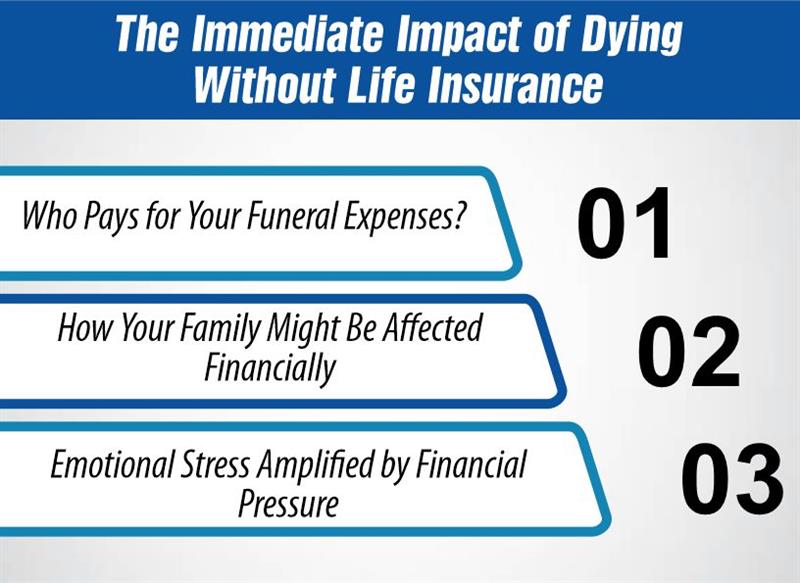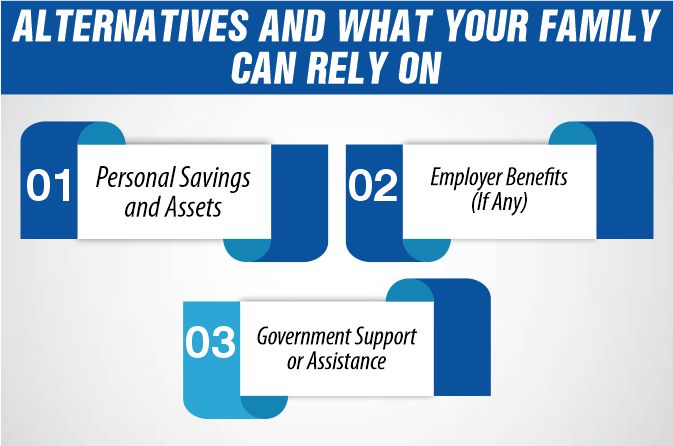Last Updated on: April 15th, 2025
Reviewed by Kyle Wilson

No one likes to think about what happens after they’re gone, but it’s an important conversation—especially when it comes to protecting the people you love. If you die without life insurance, your family could be left facing not only emotional loss but also serious financial burdens. From funeral costs to unpaid debts and daily living expenses, the absence of a financial safety net can make a difficult time even harder.
Get Free Quotes
Customized Options Await
Life insurance is one of the most important financial tools for protecting your family’s future. Before diving into what happens if you don’t have it, it’s helpful to understand how life insurance works and why people choose to invest in it. Whether you’re new to the concept or considering buying a policy, getting the basics right can help you make better decisions.
Life insurance is a financial agreement between you and an insurance provider. In simple terms, you pay a regular amount called a premium, and in return, the insurer promises to pay a lump sum of money to your beneficiaries after you pass away. This money can be used to cover funeral expenses, pay off debts, or support your family’s living costs.
There are different types of life insurance, such as term life and whole life. Term life insurance provides coverage for a set number of years, while whole life insurance covers you for your entire life and may include a savings component. Choosing the right type depends on your goals, age, and financial situation.
People buy life insurance to make sure their loved ones are financially protected if something happens to them. One of the main reasons is to help cover the cost of final expenses, like a funeral or medical bills. It also helps replace lost income, especially if you are the main earner in your household.
Another reason people invest in life insurance is to leave behind money for their children’s education, pay off a mortgage, or ensure that their family doesn’t struggle with debt. Even if you don’t have dependents, life insurance can help cover any unpaid debts or leave a legacy for a cause you care about.
When someone passes away without life insurance, the financial impact can be felt almost immediately by their loved ones. Life insurance is meant to provide fast and essential financial support, so without it, families are often left trying to figure out how to cover urgent expenses and manage emotional stress during an already painful time.
Funerals can be expensive, often costing several thousand dollars depending on the location and services. Without life insurance, this cost doesn’t go away—it falls on your family. In many cases, loved ones must use their own savings, take out loans, or start fundraising efforts just to cover burial or cremation costs. This can put unexpected pressure on those who are grieving, especially if no financial plans were made ahead of time.
If you’re the main source of income for your household, dying without life insurance can create a major gap in your family’s finances. Monthly bills like rent, utilities, groceries, and loan payments don’t stop. Without a payout from a life insurance policy, your family may struggle to keep up with everyday expenses. This can lead to debt, missed payments, or even the risk of losing a home or car.
Even if you’re not the primary earner, your contributions—such as child care, household support, or part-time work—still hold value. Without that support, the surviving family members may need to make big changes to their lifestyle and budget quickly.
Losing a loved one is one of the most emotional experiences a person can go through. When that grief is combined with financial pressure, it becomes even more overwhelming. Families left behind may have to make hard decisions under stress, like selling belongings or taking on extra work, all while trying to cope with loss.
Having life insurance can’t erase the pain of losing someone, but it can ease the financial burden and help families focus on healing instead of worrying about money. Without it, the emotional toll can be heavier and last longer due to ongoing financial struggles.

The absence of life insurance doesn’t just create short-term financial issues. Over time, your family may face serious and lasting challenges. Without a life insurance policy to provide financial support, your loved ones could find themselves in a cycle of debt, income loss, and limited opportunities for the future.
One of the biggest long-term effects of dying without life insurance is the sudden loss of income. If you’re the primary earner or contribute significantly to the household budget, your passing could leave your family without the money they rely on to cover daily living costs. Rent or mortgage payments, groceries, and transportation can quickly become difficult to manage.
Even in dual-income households, the loss of one income can be enough to cause financial hardship. Life insurance helps replace that income and gives your family time to adjust without needing to make immediate, drastic financial decisions.
Many families carry some level of debt, whether it’s from credit cards, car loans, or a mortgage. Without life insurance, your family might be responsible for paying off those debts. While some debts are canceled when someone dies, many others—especially joint loans or co-signed agreements—remain.
In addition to existing debt, your loved ones still have to manage ongoing costs like utility bills, insurance premiums, and school fees. Without financial support from a life insurance policy, these regular expenses can pile up quickly, leading to late payments, interest charges, or even default.
Children are often the most affected by the financial fallout when a parent dies without life insurance. Education plans may be delayed or completely changed due to a lack of funds. Saving for college or even paying for private school can become difficult or impossible without financial protection.
Beyond education, the overall quality of life can be affected. Opportunities like extracurricular activities, healthcare access, and a stable home environment may be reduced when money is tight. Life insurance helps ensure that children have the support they need to continue on a stable and successful path, even after the loss of a parent.
If someone dies without life insurance, families are often left searching for other ways to cover costs and stay financially stable. While life insurance is designed to offer dedicated support after death, there are some alternatives that families might turn to. These options, however, may not always be reliable or enough to handle long-term needs.
Some families may rely on personal savings, investments, or valuable assets to cover expenses after a loved one passes. This can include money in a savings account, retirement funds, or the sale of property like a house or car. However, not everyone has enough set aside to handle unexpected costs like funeral expenses, debt, or ongoing bills.
Savings can run out quickly, especially if there are medical bills or other debts to pay. Selling assets may also take time and might not bring in as much money as expected. While personal savings can offer some relief, they don’t provide the same level of security that a life insurance policy offers.
Some people receive life insurance coverage through their employer, often as part of a group benefits package. This can be a helpful resource if it’s available. However, employer-provided life insurance is usually limited and may not be enough to fully support a family after a death.
In many cases, this coverage ends when you leave the job or retire, meaning it’s not always dependable in the long run. If your family is depending on this as a backup plan, it’s important to understand how much is covered and whether it’s enough to meet their needs.
There are government programs that may offer some financial help to surviving family members, such as Social Security benefits for children or widowed spouses. In certain cases, low-income families might also qualify for public assistance or emergency grants.
However, these programs are often limited, have strict requirements, and may not provide timely help. Government assistance is rarely enough to cover all expenses, especially when it comes to long-term financial needs like housing, education, or maintaining a family’s standard of living.

Getting life insurance is one of the most important financial decisions you can make for your future and the well-being of your family. While it’s easy to put off, having life insurance in place ensures that your loved ones will be taken care of if something happens to you. It’s not just about financial protection—life insurance can provide peace of mind and help you plan for a secure future.
Life insurance gives you and your family peace of mind knowing that, in the event of your death, they won’t have to struggle financially. Whether it’s paying off debt, covering funeral expenses, or maintaining the household, life insurance helps provide financial stability during an already difficult time. With the right coverage, you can rest assured that your loved ones will have the support they need, even if you’re no longer around to provide it.
For many people, knowing that their family is protected allows them to live with less worry. Life insurance is an essential tool for building financial security for both you and those who rely on you.
Life insurance doesn’t have to break the bank. Many people are surprised to learn how affordable it can be, especially if you purchase a term life policy. The cost of coverage depends on factors like age, health, and the amount of coverage you choose, but there are options to fit nearly every budget.
Whether you’re just starting your career or approaching retirement, there are plans that offer great value at different price points. By shopping around and comparing policies, you can find an option that fits your financial situation. Life insurance is an investment in your family’s future, and the benefits far outweigh the cost.
The best time to get life insurance is sooner rather than later. Many people think they don’t need it until they have children or a mortgage, but the truth is that the earlier you start, the lower your premiums will likely be. As you get older or develop health issues, life insurance may become more expensive or harder to qualify for.
Starting early allows you to lock in a lower rate and secure coverage before life’s uncertainties increase. It’s also important to update your policy over time, especially as your circumstances change—like getting married, having children, or buying a home.
Dying without life insurance can leave your family facing significant financial challenges. From funeral expenses to the loss of household income and long-term debt struggles, the absence of life insurance can make an already difficult time even harder. While there are some alternatives to rely on, like personal savings or employer benefits, they may not provide the level of financial security needed to protect your loved ones in the long run.
If you die without life insurance, your debts don’t automatically go away. Some debts, like mortgages, credit card balances, or loans, may still need to be paid. In most cases, your estate will be responsible for paying off these debts. If there isn’t enough money in the estate, your family members may not be personally liable, but they could face the burden of settling the estate or dealing with creditor claims.
Without life insurance, your family may struggle to cover funeral expenses. Funerals can be expensive, with costs ranging from thousands to tens of thousands of dollars, depending on the services. Without financial support from life insurance, your loved ones might have to use savings, take on debt, or seek financial assistance to pay for the funeral.
While life insurance is most commonly associated with those who have dependents, it can still be useful for people without children or other dependents. If you have debts, a mortgage, or want to leave a legacy, life insurance can help cover those expenses and ease the financial burden on your family members.
If you can’t afford life insurance at the moment, there are options to consider. Many people start with a basic, term life insurance policy, which tends to be more affordable than whole life insurance. You can also look into employer-sponsored life insurance plans, which might offer coverage at a lower cost.
Senior Writer & Licensed Life Insurance Agent
Iqra is a dynamic and insightful senior writer with a passion for life insurance and financial planning. With over 8 years of hands-on experience in the insurance industry, Iqra has earned a reputation for delivering clear, actionable advice that empowers individuals to make informed decisions about their financial future. At Burial Senior Insurance, she not only excels as a licensed insurance agent but also as a trusted guide who has successfully advised over +1500 clients, helping them navigate the often complex world of life insurance and annuities. Her articles have been featured in top-tier financial publications, making her a respected voice in the industry.

Burial Senior Insurance provides information and services related to burial insurance for senior citizens, including policy options and end-of-life support services.
Copyright © Burial Senior Insurance 2025. All Right Reserved.

Get Free Life Insurance Quotes